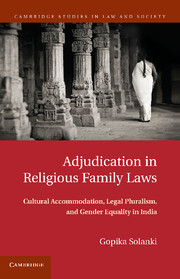Crossref Citations
This Book has been
cited by the following publications. This list is generated based on data provided by Crossref.
Holden, Livia
and
Chaudhary, Azam
2013.
Daughters’ inheritance, legal pluralism, and governance in Pakistan.
The Journal of Legal Pluralism and Unofficial Law,
Vol. 45,
Issue. 1,
p.
104.
Solanki, Gopika
2013.
Beyond the Limitations of the Impasse: Feminism, Multiculturalism, and Legal Reforms in Religious Family Laws in India.
Politikon,
Vol. 40,
Issue. 1,
p.
83.
Vatuk, Sylvia
2013.
The “women's court” in India: an alternative dispute resolution body for women in distress.
The Journal of Legal Pluralism and Unofficial Law,
Vol. 45,
Issue. 1,
p.
76.
Solanki, Gopika
2013.
The Retelling of Tales: Disentangling the Feminist Evolutionary Analytic Approach, Legal Pluralism, and Gender Justice.
Politics & Gender,
Vol. 9,
Issue. 1,
p.
105.
Mattausch, John
2014.
Gandhi’s Prescription.
South Asia Research,
Vol. 34,
Issue. 2,
p.
155.
REDDING, JEFFREY A.
2014.
The Case of Ayesha, Muslim ‘Courts’, and the Rule of Law: Some ethnographic lessons for legal theory.
Modern Asian Studies,
Vol. 48,
Issue. 4,
p.
940.
Stephens, Julia
2014.
An Uncertain Inheritance: The Imperial Travels of Legal Migrants, from British India to Ottoman Iraq.
Law and History Review,
Vol. 32,
Issue. 4,
p.
749.
Krishnan, Jayanth K.
and
Thomas, Patrick W.
2015.
Surveying Key Aspects of Sociolegal Scholarship on India: An Overview.
Annual Review of Law and Social Science,
Vol. 11,
Issue. 1,
p.
337.
Choudhary, Neetu
2015.
Malnutrition in Mumbai Slums.
South Asia Research,
Vol. 35,
Issue. 3,
p.
280.
Sharafi, Mitra
2015.
South Asian Legal History.
Annual Review of Law and Social Science,
Vol. 11,
Issue. 1,
p.
309.
Dommaraju, Premchand
2016.
Divorce and Separation in India.
Population and Development Review,
Vol. 42,
Issue. 2,
p.
195.
Chakrabarti, Anindita
2016.
Democracy as Civil Religion: Reading Alexis De Tocqueville in India.
Journal of Human Values,
Vol. 22,
Issue. 1,
p.
14.
Relis, Tamara
2016.
Unifying benefits of studies in legal pluralism: accessing actors’ voices on human rights and legal pluralities in gender violence cases in India.
The Journal of Legal Pluralism and Unofficial Law,
Vol. 48,
Issue. 3,
p.
354.
Das, Joyce
2016.
Good laws, bad outcomes: land rights and inheritance practices for Christian women in Bangladesh.
The Journal of Legal Pluralism and Unofficial Law,
Vol. 48,
Issue. 2,
p.
159.
KOWALSKI, JULIA
2016.
Ordering dependence: Care, disorder, and kinship ideology in North Indian antiviolence counseling.
American Ethnologist,
Vol. 43,
Issue. 1,
p.
63.
Künkler, Mirjam
and
Sezgin, Yüksel
2016.
The Unification of Law and the Postcolonial State.
American Behavioral Scientist,
Vol. 60,
Issue. 8,
p.
987.
Lemons, Katherine
2016.
The Politics of Livability: Tutoring “Kinwork” in a New Delhi Women's Arbitration Center.
PoLAR: Political and Legal Anthropology Review,
Vol. 39,
Issue. 2,
p.
244.
Ahmed, Farrah
2016.
Remedying Personal Law Systems:.
International Journal of Law, Policy and the Family,
Vol. 30,
Issue. 3,
p.
248.
2017.
The Politics of Bureaucratic Corruption in Post-Transitional Eastern Europe.
p.
215.
CHOUDHURY, Nafay
2017.
RevisitingCriticalLegal Pluralism: Normative Contestations in the Afghan Courtroom.
Asian Journal of Law and Society,
Vol. 4,
Issue. 1,
p.
229.



